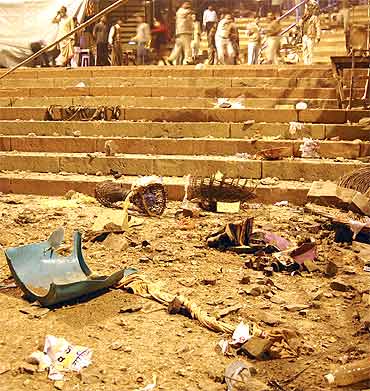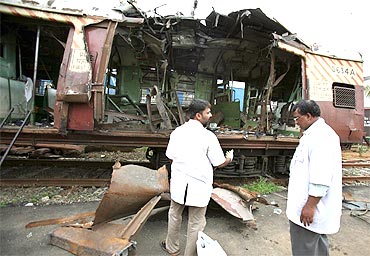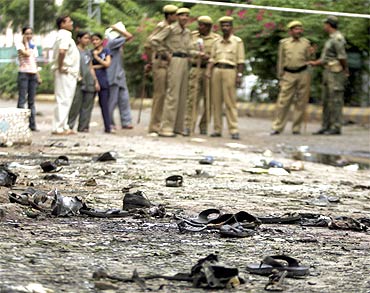Photographs: Reuters
Unabated terror financing from the Gulf countries continues to be a major challenge for security agencies across the world, reports Vicky Nanjappa.
The recent revelations by made by whistleblower website WikiLeaks regarding funding for terrorism by the Gulf nations is something that has been often discussed by security agencies, and this has also figured in the interrogation reports of various terror suspects who have been nabbed in India.
This revelation yet again gains prominence in the wake of the Varanasi blast which -- investigating agencies have managed to establish -- was launched from the Gulf. Intelligence agencies are currently studying the manner in which prime suspects Sharjah-based Dr Shahnawaz and Asadullah Akthar raised funds for the attack.
Intelligence Bureau officials have constantly pointed out several times in the past regarding the nexus between terrorist groups and financing from the Gulf nations. Post the 9/11 attacks on the United States, there were several reports that indicated that a majority of the funding for that operation came from the Gulf and one of the main conspirators of that attack, Yusuf Ramzi,had managed to extract money from sympathisers in the Gulf for that operation.
..
Why terror financing from Gulf continues unabated
Image: Forensic officers examine a damaged train compartment hit by bomb blast in Mumbai on July 12, 2006Photographs: Pinit Paranjpe/Reuters
The real big funding from the Gulf for terror operations in India came to light in the aftermath of the train bombings of 2006 in Mumbai. During the course of the investigation and subsequent raids that were conducted, the police managed to seize 37,000 Saudi riyals (about Rs 4.5 lakhs) from Faizal At-a-ur Rehman, who ran a major cell for the Lashkar-e-Tayiba in Mumbai.
A major part of the terror financing for operations in India were either covered by the drug mafia being run by fugitive gangster Dawood Ibrahim or the money was raised through fake currency. However, Pakistani spy agency Inter Services Intelligence felt that they needed to make good use of the money that was available in Saudi Arabia for terror operations since it was easier to raise money through this channel.
If one looks at all the operations carried out by the Indian Mujahideen and the investigations that have followed, it becomes clear that all their operations were funded by businessmen from the Gulf.
Sources in the Intelligence Bureau say that there is no real check for money transfer in those countries and it is easy for them to raise funds and transfer it through a hawala network into India. Members of the IM such as the Bhatkal brothers were posted in the Gulf for a considerable period of time to raise money for terror operations. They have managed to set up a full-fledged base in these countries and there are persons specifically tasked to carry out the funding operations.
According to intelligence reports, these operatives relied heavily on an already existing network of the Lashkar. They contacted businessmen who were sympathetic towards their cause.
When the ISI instructed the Indian Mujahideen to operate out of the Gulf, they were also specifically told to move funds into Kerala since there was a lot of movement of people between these two places.
If one looks at the manner in which the funds have been transferred in the recent years it becomes clear that all the funds have been moved into Kerala and then moved to the rest of the country.
Normally, these operatives use the migrating working class to transfer money. However they are not afraid to carry out a bank transaction as it is very difficult to trace them, since it looks like a legitimate transaction.
IB sources say that there is not too much monitoring in the Gulf and this is the concern that even the United States had raised post 9/11. The money is collected in the name of charity under the banner of fake organisations. Unless there is stringent policing it is very difficult to monitor such terror transactions.
Why terror financing from Gulf continues unabated
Image: Security personnel at the site of a bomb blast in Ahmedabad on July 27, 2008Photographs: Amit Dave/Reuters
Going deeper into the financial transactions from the Gulf, Indian investigators have zeroed on three crucial persons who have mastered this job. Shameem, Basheer and Haroon are the three who have made a difference to the terror groups in setting up the financial network in the Gulf.
Basheer, another Pakistani based in Muscat, was also in charge of coordinating with the cadres in raising funds. Haroon, a travel agent, also played a very important role in transferring the money. He legalised the money and transacted it through valid accounts to ensure that the money reached India.
The network set up by these men and the money raised through the businessmen in the Gulf was used by the Indian Mujahideen for the first time when they carried out blasts in Bangalore, Ahmedabad, Delhi and Surat.
It was the Mumbai police which first got a whiff of this link and traced the funds back to the Gulf. The police had then said that the money was raised in the Gulf and then transferred to Ernakulam in Kerala. It also became clear that these groups had used the banner Gujarat Muslim Revenge Force to raise this money.
Like the Babri Masjid, the apparent acts of violence against Muslims during the 2002 post Godhra riots in Gujarat, is a pretty emotive issue and terrorists manage to collect funds with ease while quoting these two incidents.
Indian security agencies say that it has been rightly pointed out that the Gulf continues to be a happy hunting ground for terrorists at least in terms of finance. The laws over there to counter a hawala transaction of money laundering for so called 'charity' continues not to be up to the mark.
The IB points out that even the recent Varanasi bombing was funded through Gulf money and this goes on to show that the network is still active and terror financing continues unabated.
Stephen Tankel, author of the book Lashkar-e-Tayiba, From 9/11 to Mumbai also pointed out in a recent interview that the Lashkar, which is the richest Pakistani militant group, raises significant amounts of money from the Gulf.




article